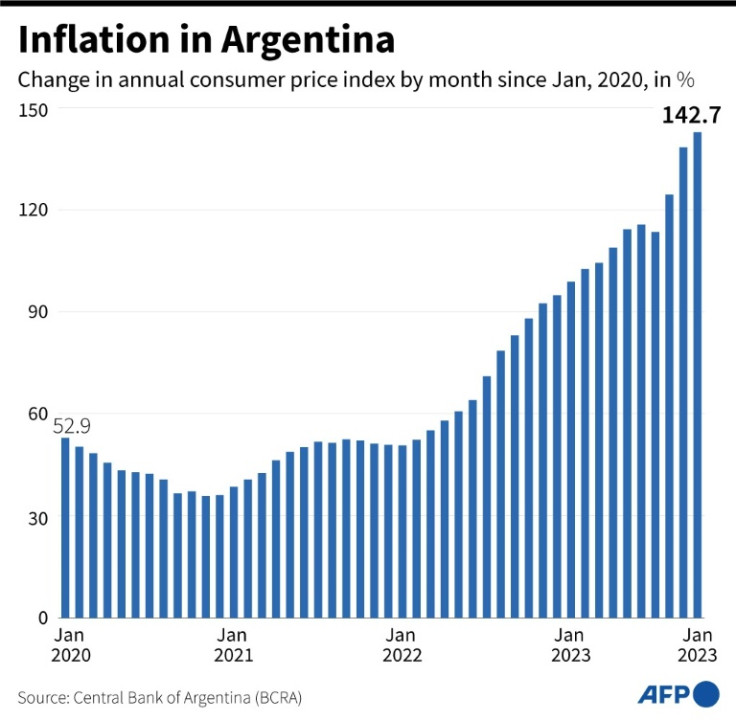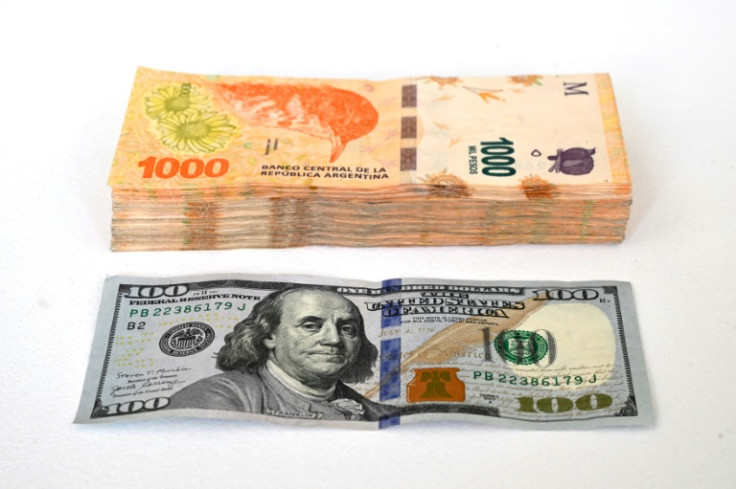Argentina Faces Nail-biter Election As Economy Crumbles

Argentines head to the polls Sunday in a down-to-the-wire race between two wildly different presidential candidates, with many frozen by indecision over which choice will rescue them from triple-digit inflation.
One candidate is Economy Minister Sergio Massa, 51, who has overseen annual inflation of 143 percent and record poverty levels.
His rival is a complete outsider, the libertarian and self-described "anarcho-capitalist" Javier Milei, who has vowed to halt Argentina's unbridled spending, ditch the peso for the US dollar, and "dynamite" the central bank.
Polls have the candidates neck-and-neck, with Milei at a very slight advantage.
"It's very, very uncertain. And a lot of voters are going to make their decision literally in the last day, or hours, even at the voting booth," said Nicolas Saldias, a senior analyst with the Economist Intelligence Unit.
The stakes are enormous for Latin America's third-biggest economy, which has struggled with decades of fiscal woes.
With over $400 billion in public debt, central bank reserves in the red, and no credit line, the next government "will be digging Argentina out of an unbelievably deep hole with very few resources to do so," said Benjamin Gedan, director of the Argentina Project at the Washington-based Wilson Center.
Despite heavy government subsidies of fuel, transport and electricity, and millions receiving social welfare, poverty levels stand at over 40 percent.
"Argentina has been a macroeconomic and social disaster for 50 years," said analyst Carlos Gervasoni of the Universidad Torcuato Di Tella.
He said the emergence of Milei, a TikTok-savvy outsider who has upended Argentine politics and fired up the youth, was the consequence of decades of decline and stagnation in the country.
"What exists now doesn't work for me. Maybe this change would be good," said Milei supporter Matias Esoukourian, a 19-year-old economics student.
The 53-year-old Buenos Aires lawmaker with wild hair and a rock-star persona has gripped a disillusioned public with his fiery outbursts against a "thieving and useless political class."
Before a first-round vote in October, he would leap onto stage with a powered-up chainsaw, vowing to slash public spending.
He is against abortion and has said he wanted to make it easier to buy guns and sell human organs. He has also denied humans are responsible for climate change and frequently insulted Pope Francis, a fellow Argentine.
While Milei had led the polls before the first round, it was Massa who confounded expectations by scoring the most votes in the October election, leading by 7 points.
This has led Milei to tone down his rhetoric in a bid to appeal to more moderate voters, saying dollarization will be more incremental, ditching the chainsaw, and trying to avoid angry outbursts.
He also won the key backing of Patricia Bullrich, who placed third in the first-round -- though it remains to be seen if her voters will back him.
Massa, meanwhile, has worked hard to distance himself from the more controversial members of his unpopular ruling Peronist coalition.
Gervasoni, the analyst, said Massa has been "openly and shamelessly using the state apparatus" to help his electoral chances.
This includes using adverts to warn transport prices would increase under Milei as well as slashing taxes and granting cash payouts to millions.
"He can't run on his record, given how disastrously he's managed the economy, and he can't really run on his ideas, because if he had good ideas, you'd be seeing him implement them," said the Wilson Center's Gedan.
"And so, what's left for him is to fearmonger about what a Milei presidency would mean, whether that's the dismantling of the social welfare system or wrecking Argentina's key foreign relationships."
Maria Lopez, 39, an employee at a trendy jewelry store in the capital, said she felt "bewildered," but didn't want to cast a blank ballot.
She and her husband have stalled their plan to try for a baby in the current economy.
"You can't plan the future, whether it's children or projects. Rent went through the roof. It gets harder and harder to make it to the end of the month."
"It's scary not knowing what will happen" after the election, she said.
Analysts say a devaluation of the strictly controlled peso is inevitable, with the value of black-market dollars now 150 percent higher than the official exchange.
Political analyst Ana Iparraguirre said that Argentines should brace themselves.
"Whoever comes into office has to make some quick decisions that are going to hurt people."




© Copyright AFP 2024. All rights reserved.





















